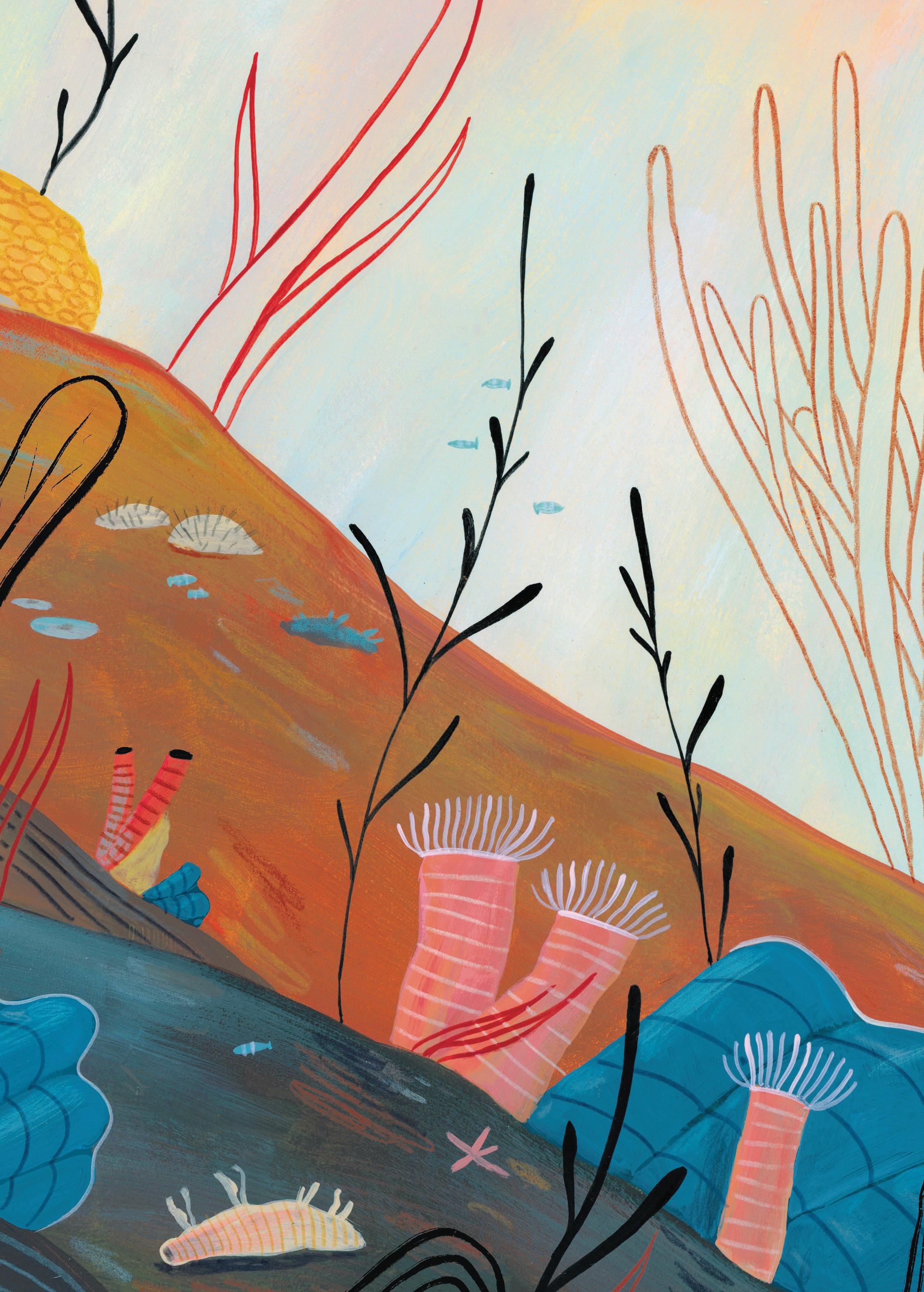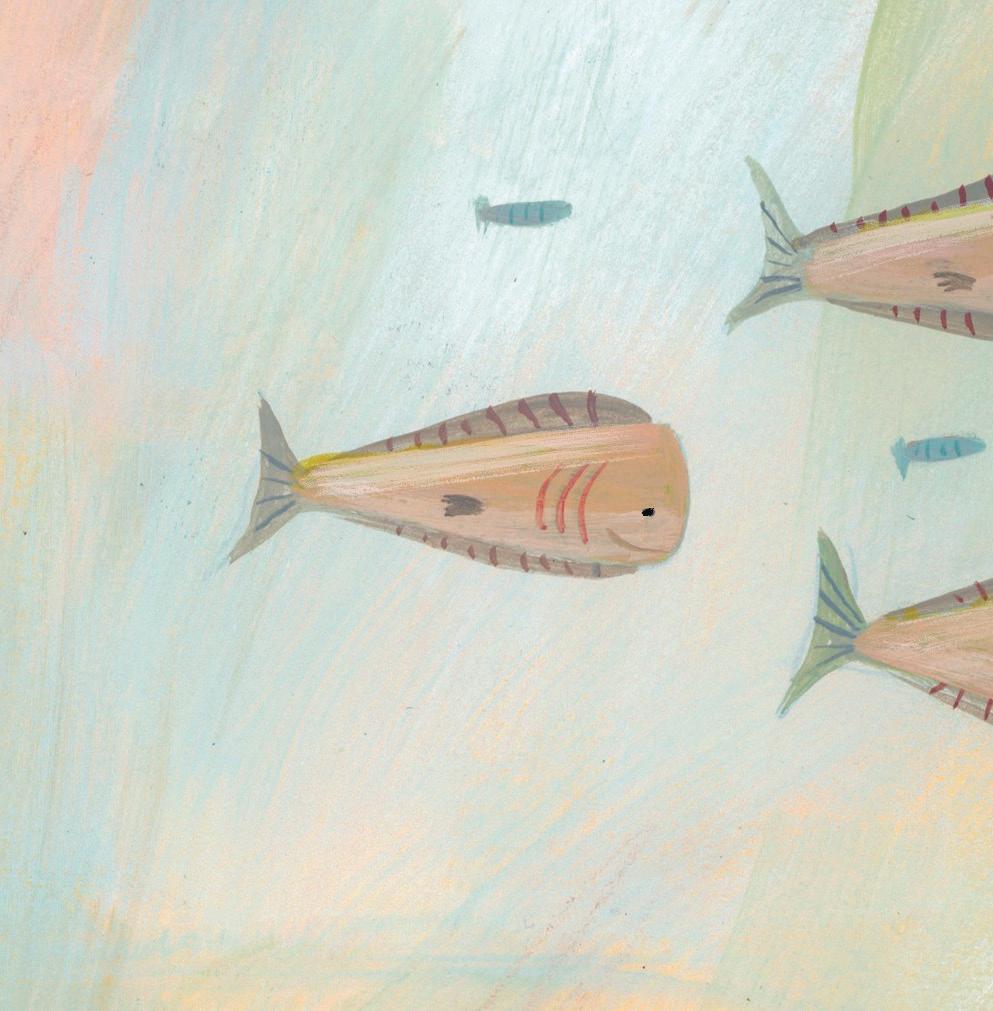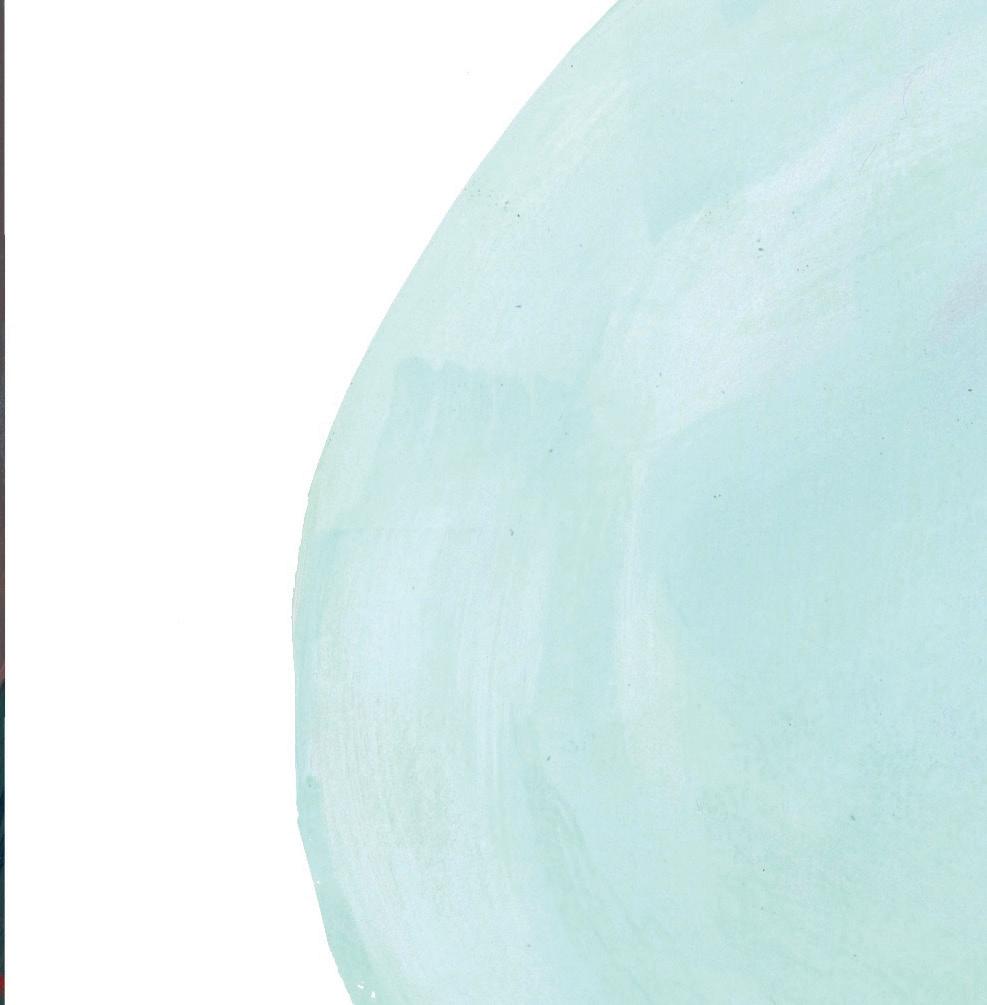


For my wife, Lauren, who doesn’t vomit when I’m singing.
—M.H.
Text copyright © 2023 The Hawkins Project Illustrations copyright © 2023 Mark Hoffmann
Book design by Melissa Nelson Greenberg

Published in 2023 by CAMERON + COMPANY, a division of ABRAMS. All rights reserved. No portion of this book may be reproduced, stored in a retrieval system, or transmitted in any form or by any means, mechanical, electronic, photocopying, recording, or otherwise, without written permission from the publisher.
Library of Congress Cataloging-in-Publication Data available.
ISBN: 978-1-951836-73-3
Printed in China
CAMERON KIDS is an imprint of CAMERON + COMPANY
Cameron + Company Petaluma, California www.cameronbooks.com
To Mark, to Nina, and to everyone at Cameron + Co. —D.E.


You may have heard of whales. They are like people, only larger, and they live in the water and do not drive cars and cannot tell time.

You may have heard of one particular kind of whale, called the humpback whale, which is gray and barnacled and has an extreme underbite that is hard not to notice but rude to comment on.
If you know of the humpback whale, you may know that the humpback whale is known for its singing. This part of the book is true.



The male humpback whales know how to sing, and they make up songs, different songs every year. Some of these songs are very long—even twenty minutes long—and they sing them over and over and over. Scientists have proven this.

Why do these whales do this singing? To impress women. Female humpback whales, that is. This is true! The male whales will sing songs and send out these songs hundreds of miles underwater, all in hopes that a female whale will hear their song and will want to go on a whale date with the singer of the song. This is absolutely factual. But the rest of this book is made up.













Not too long ago, among the humpback whales, there was a whale named Soren. He was a young whale, what we might consider a teenager, and he thought the songs sung by the male whales were the most outrageously boring songs imaginable. The songs were so slooooow. And so looooong. And droning, so drooooning. Every time he heard one of these songs, he got a splitting headache and wanted to put his huge head in a giant clam, which he often did.

Soren had new ideas for songs—songs that were not twenty minutes long. Songs that did not sound like a seagull was being knelt upon. Soren wanted to make shorter, catchier songs, with melodies, and choruses, and maybe even maracas or theremins. He had ideas! And none of them had anything to do with whale women or whale girls, because he was too young to think about either.













So after thinking for years about what a new kind of whale song could be, one day Soren decided to get to work. He went to a quiet corner of the sea—you wouldn’t know it; it’s out of the way; it’s past the island the birds do their business on—and after many hours of composing and practicing, he had a song. Soren was pretty sure the song had everything he had hoped. It had melody, and it was catchy, and he’d made his voice sound a bit like maracas, and at the last minute he even added a high-pitched squeaky sound that he thought would end the song on a fun, upbeat note.

“Hey!” he said to his friends, who were also whales. “Want to hear a song I wrote?”
His whale friends were not so interested in hearing his song, because they, too, could not stand the long and droning whale songs that the older whales sang, and they expected that Soren’s song would be like those songs that they did not like.

“Wait, wait!” Soren said. “This one is different!” And though his friends made doubtful noises and put on doubtful faces, they were actually sort of intrigued, because, like we just mentioned, they were very tired of the old whale songs.
So Soren began singing his whale song, and he was so into it, and so afraid of watching their reaction while he sang that he closed his eyes. He sang the high notes and low notes, made the maracas sound with his mouth, and then finished with the fun, high-pitched squeaky sound at the end. And because he thought he sang pretty well, when he was done . . .

. . . he opened his eyes.

“That,” said one of the whales, whose name happened to be Hans, “was by far the worst song any whale has ever sung. And I’m telling you that because I’m your friend.”

Hans actually was a good friend to Soren and always gave Soren any extra krill he had, which was very kind of him, because Soren could not get enough krill. He really loved krill.
But Soren did not love what had just happened.
Soren had worked all day on a song and had sung the song pretty well, he thought, and still, Hans had not liked it (at all), and the other whales had seemed to agree with Hans. One of the other whales had actually vomited from the sound of Soren’s song but had hidden this from everyone by vomiting into the whale equivalent of his underarm, which is known among whales as an underfin. That is scientific.


So Soren swam off into the sea of dark blue, feeling very blue, too. He swam angrily at first, because he was mad at Hans for saying what he said. Soren breached a few times, because sometimes he breached when he was very mad. Finally, after all his swimming and breaching, he was tired, and he went to sleep. He slept in the whale way, of course, which is called unihemispheric slowwave sleep, which is really a complicated way of saying that only half of Soren’s brain slept at one time.



When he awoke, Soren was still a bit sad about how things had gone down with his song, but while he’d been sleeping and in the early hours of the new day, he thought of ways he might improve the song. In a rush of new inspiration, he worked on the song all day long, making some parts longer and some parts shorter, some parts faster and some parts louder. The part with the maracas was definitely A LOT LOUDER.
After all that work—easily three hours of work!—Soren was so excited that he rushed back to Hans, who was hanging out with these other whales named Odin and Cathy, who Soren didn’t know much about but seemed pretty cool. “I made it better!” Soren said to all of them.
And because Hans was a good friend, he encouraged Soren to sing the song again. And Soren did, and this time he sang it with more feeling. He closed his eyes tighter, and he danced a little bit to emphasize certain emotional parts of the song, and he made the maracas part VERY, VERY LOUD, and when he was finished, he was pretty sure he’d just sung the greatest song any whale had ever sung.

Cathy said nothing, and Odin said nothing, and the saying-of-nothing seemed like bad news to Soren. Maybe they were stunned by the song’s greatness? Finally, it was up to Hans to say what they were all thinking. “Buddy!” Hans said, after vomiting discreetly into his underfin, “That was very disturbing. I would say it was awful, but it was not good enough to be awful.”
And Soren was instantly very mad again, and instantly he turned around so he did not have to hear any more of that kind of thing, but as he was leaving, whale-style (it is a stylish kind of leaving), he heard Hans say, “But it was a little better than the first version.”



And that little bit of encouragement, even though coming at the end of a very unhappy string of words, gave Soren just a hint of hope, and after more angry swimming and angry breaching and then some helpful unihemispheric slow-wave sleep, Soren woke up again, ready to work some more on his song. However! The one thing Soren was unsure about was the maracas. He had not asked Hans about the maracas, whether Hans was pro-maracas or anti-maracas, so he rushed back toward Hans, and even when he was about five miles away, Hans knew what he was going to ask. So he said, loudly, “Please no more maracas. They are a big part of the problem!” And so that was settled. No more maracas.







Again Soren worked and worked, and this time he even practiced the song alone, in a cave he knew, where the acoustics were very good, and no one would hear him but some eels, and eels like everything; they are so easy to please, you wouldn’t believe it. And at the end of this third and most extensive revision-and-practice session—which took four hours this time, maybe four and a half!—Soren returned to Hans, and Hans again was very willing to hear his friend’s song.






But when Soren sang his song, he saw—because this time he kept his eyes open—he saw, on Hans’s face, something like revulsion, and then something like horror, and then Hans seemed to be laughing, and then he did that thing where he hid his head in his underfin, the way whales do when vomiting politely, only this time he did it twice. Some of the vomit even eked out and drifted slowly around the sea like pink confetti, which was beautiful in a way, but still.
When Soren was done, Hans put his fin around his friend and said, “Listen, I don’t know how you did it. That was somehow worse than the first two versions.” Soren was briefly crushed, but then Hans said this: “But I will always be here to listen to you sing, because as bad as your singing is so far, it’s still kind of better than the droning the older males have been doing since the beginning of time. So I guess that’s me saying keep going. Or don’t. Up to you.”



Soren kept going. Though he did not like the image of Hans’s vomit drifting around the sea like pink confetti, he was again encouraged by the tiny sliver of hope Hans offered. To be better than the old-whale droning was his original goal, and he had gotten there. That was something.

So Soren went to the quiet place where the easyto-please eels were, and he practiced and rewrote and practiced. Again, the eels loved every minute of it, and again, after practicing and revising and playing and practicing, Soren raced back to Hans and began singing.
“Let me stop you there,” Hans said, after only a few notes. Immediately Soren knew why. Maracas! He’d put them back in! Why did I do that? he wondered to himself as he swam quickly back to the eels.
Soren rewrote the song again, without any maracas at all this time, and worked late into the ocean-night (which is the same as day, really, let’s be honest; it’s all so dark and cold), and then, exhausted, Soren did some very nice and restorative unihemispheric slow-wave sleeping.
When he woke up, he worked on the song again— twenty more minutes!—and rushed again to Hans, who was eating a krill omelet. “Before we start,” Hans said. “No maracas? No theremin?”
“No maracas, no theremin,” Soren said, and he sang this new version, and this time, even though Hans had a mouthful of krill omelet, he did not vomit it into his underfin. When Soren was finished, he asked Hans how the song was, and Hans shrugged and said, “Erp.”



“Erp” was by far the best reaction he’d had so far! So Soren rushed back to his eel sanctuary and worked even harder on his song. Every so often he would ask the eels what they thought, and they would say, “Super!” which is what eels say about everything. But still, it helped. Every little bit of easy eel praise gave him strength.
And the next day, Soren yet again brought the song to Hans, who this time was eating lunch, which was krill, of course, but now in sandwich form. While Soren sang, this time Hans did not vomit and did not make terrified faces. At the end he even said, “Well,” and then, “Hm,” which was almost like saying, “That song is the greatest of all time!” This is what Soren thought as he swam away.

And hearing those wonderful words well and hm in his mind as he swam, Soren had a thought, which was that maybe, seeing as if he was on the verge of the greatest song ever sung, he should take a bit more time on his song. And then he remembered why he had this thought, about taking more time and such. It was because Hans had told him to! Hans had said, “Buddy. It’s getting better. But take your time. Maybe don’t rush back here tomorrow. Maybe take a few days. A week, even! Slow down. Enjoy it, practice it, hone your craft!”
Hans really was a wise whale, for a teenaged one, Soren thought as he swam away, far away, so he could be alone with his song.



Soren swam and swam, and as he swam, he took in the beauty of the ocean, and the beauty of a nearby coral reef, and the gorgeous effect of the sun refracting through the ceiling of the sea, and he heard the click of some lobsters moving across the seabed, and heard the tapping of a narwhal’s horn against an iceberg, and he had the idea to put all these things in the song he was singing. Of course! All this bright beauty was all around him, and he’d neglected to describe it, to sing it! So he took all these things in and added some of them into his song, and pretty soon he was hundreds of miles from home and was singing loudly about everything he loved, and many other fish and mammals were listening to him . . .

. . . and none of them were vomiting. Not a one! In fact, some lobsters were sort of grooving to his song, and some seaweeds were swaying, and a pod of dolphins was dancing, and a bunch of barracuda, who really have no rhythm and don’t like to boogie, were boogying quite seriously to the song Soren was singing. And as he passed, they said things like, “Way to go, whale boy!” and “That sure beats the endless death-knell droning of your fathers!” and “I especially like it a lot because it has no maracas, because maracas would not work in this particular song and with your limited vocal range!”



And all of this made Soren feel very good, very confident, and very happy he had taken his time. He had swum the sea and honed his craft, and had sung his song for lobsters, who—this is so true—are very influential among sea creatures (and not just edible crustaceans). Without their early say-so, who knows if Soren’s song would have taken off?

But it did! It became the hit whale song of that year, easily eclipsing the other, older whale songs, which really are impossibly boring—objectively they are the worst. His song made its way from the North Sea to the Red Sea to the Caribbean and Antarctic and was popular among both saltwater fish and freshwater dwellers, too, which was remarkable, because generally the freshwater dwellers prefer country, and sometimes country-western, music.


And Hans? When finally Hans heard the song, he was eating some warm krill soup, and when he heard Soren’s song—remember, this was after the song had basically taken over the underwater world—Hans did not vomit or even think of vomiting. He said the most explosively flattering thing he had ever said to Soren or anyone, which was, “Okay.” And then he finished his soup.
THE END.


